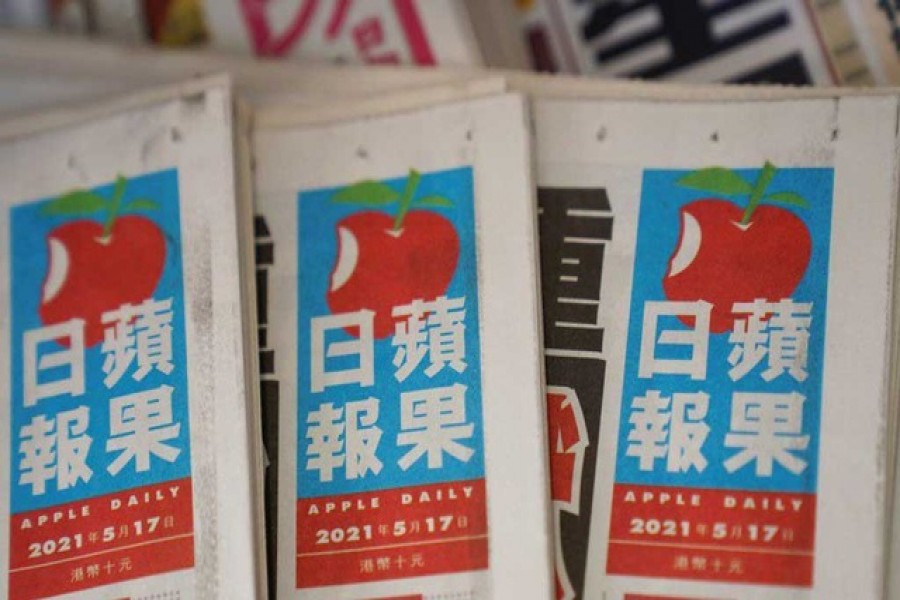Five hundred Hong Kong police officers sifted through reporters' computers and notebooks at pro-democracy tabloid Apple Daily on Thursday, the first case in which authorities have cited media articles as potentially violating the national security law.
Around dawn, police arrested five executives of the newspaper, and officers were later seen sitting at computers in the newsroom after entering with a warrant to seize journalistic materials.
The raid is the latest blow to media tycoon Jimmy Lai, the tabloid's owner and a staunch Beijing critic, whose assets have been seized under the security law and who is serving prison sentences for taking part in illegal assemblies.
Police said the warrant was aimed at gathering evidence, including from reporters' phones and computers, raising alarm about media freedoms.
It said the tabloid published dozens of reports dating back to 2019 that may have breached the security law, without saying when the most recent articles in question were. The legislation is not retrospective but prosecutors can use actions from before its implementation as evidence.
"The nature of the articles is very simple: inciting, requesting foreign countries to impose sanctions on Hong Kong and the People's Republic of China. Very straightforward," senior superintendent Li Kwai-wah told reporters outside the paper's headquarters.
Li said police have also frozen HK$18 million ($2.32 million) of assets owned by three companies linked to Apple Daily and that the raid was not targeted at the media industry as a whole, reports Reuters.
"This is a blatant attack on the editorial side of Apple Daily," Mark Simon, an adviser to Lai who is outside Hong Kong, told Reuters. "They're arresting the top editorial folks."
It was the second time police have raided the Apple Daily headquarters; 200 officers went in last year to arrest Lai on suspicion of colluding with foreign forces.
Lai has been in detention since December, denied bail under the security law and serving several sentences for taking part in some unauthorised rallies, including during the global financial hub's mass pro-democracy protests in 2019.
The security law was Beijing's first major move to set China's most restive city on an authoritarian path. It punishes anything Beijing deems as subversion, secessionism, terrorism and collusion with foreign forces with up to life in prison.
National security police said in a statement that five directors of a company had been arrested on suspicion of collusion with a foreign country or with external elements. Hong Kong police do not name arrestees.
Apple Daily said editor-in-chief Ryan Law, chief executive officer Cheung Kim-hung, Chief Operating Officer Chow Tat-kuen, Deputy Chief Editor Chan Puiman and Chief Executive Editor Cheung Chi-wai had all been arrested in morning raids.
Pictures published by Apple Daily showed police sitting at reporters' desks and using their computers. A person streaming a live feed for Apple Daily's Facebook page said reporters were prevented from accessing certain floors or getting their equipment or notebooks.
Chief editor Law was seen walking in handcuffs, flanked by police officers. The Apple Daily paper's general news desk told reporters in a text message seen by Reuters to carry on with their assignments outside the building for the time being.
The move is the latest blow to Apple Daily after authorities last month directed jailed tycoon Lai's shares in Next Digital , publisher of the newspaper, to be frozen.
Asked how long he thinks the newspaper can survive, Simon said: "It's not up to us. It's up to them. There's 100 police officers in our newsroom. They decide, not us."
Apple Daily is an unapologetic tabloid that mixes pro-democracy discourse with celebrity gossip and investigations of those in power and is popular in Hong Kong.
In May, Reuters reported that Hong Kong's security chief sent letters to Lai and branches of HSBC and Citibank threatening up to seven years in jail for any dealings with the billionaire's accounts in the city.
Lai's assets were also frozen under the same law.


